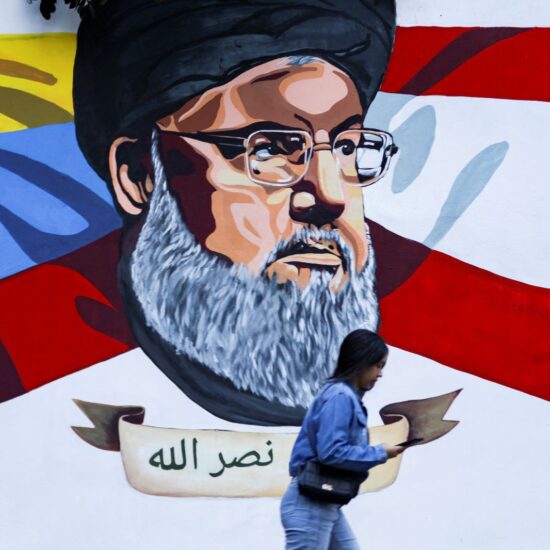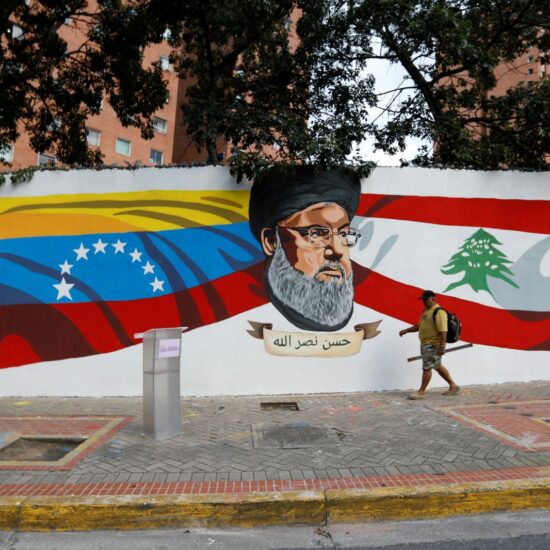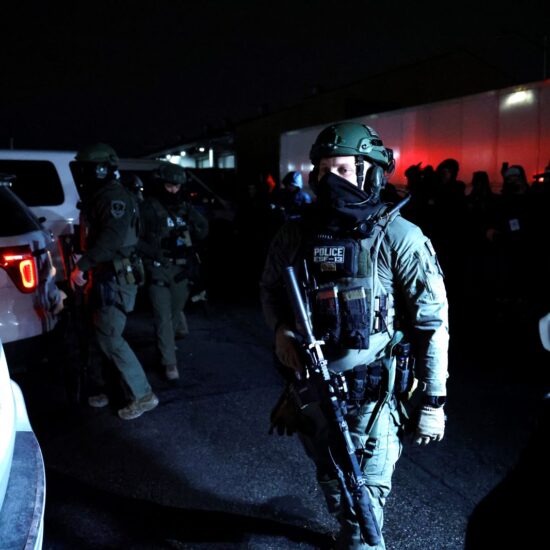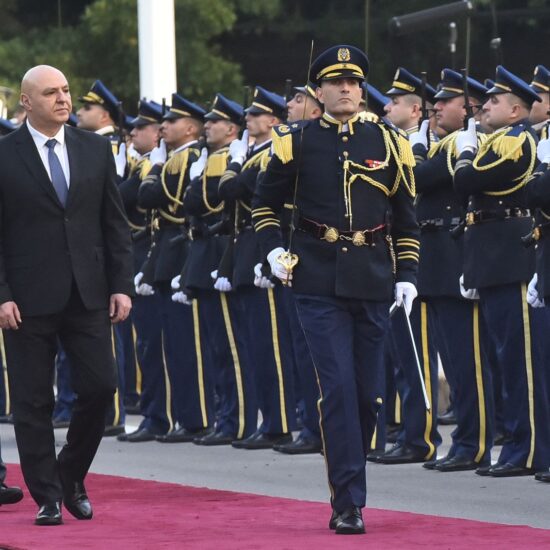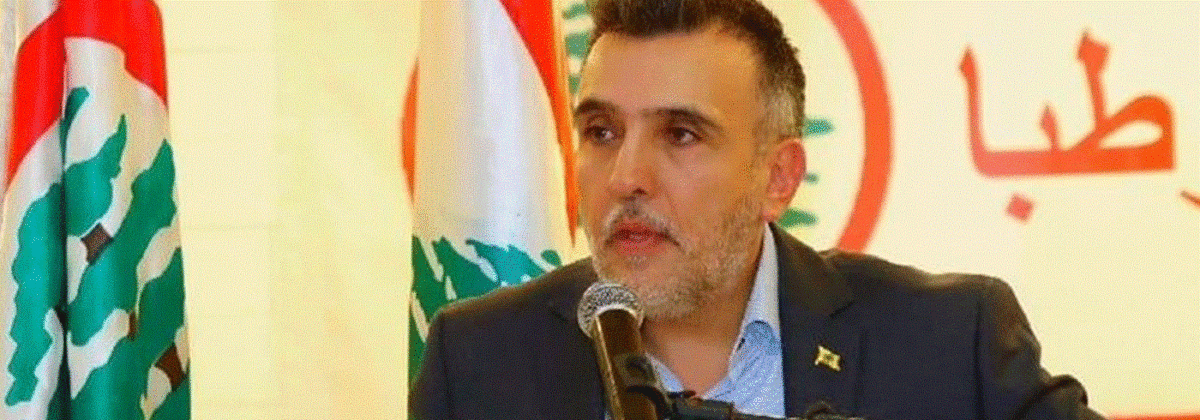
Lebanese Forces Executive Pascal Sleiman kidnapped in Jbeil, Six months after Al-Aqsa Flood, Nasrallah on Jerusalem Day calls for an inevitable Iranian response to Israel’s deadly strike on Damascus, Mikati declares southern Lebanon an agricultural disaster zone, US approves thousands of bombs for Israel on same day as seven aid workers killed, Lebanon announces a new plan to deport Syrian refugees who do not fall under displacement criteria, Cyprus seeks EU help to curb surge of refugees from Lebanon, Thousands of Israeli demonstrators packed streets in Jerusalem demanding Netanyahu’s government to resign, Knesset takes immediate action to stop Al Jazeera’s activities in Israel, Explosion kills eight children in Syria’s Daraa, Lebanese cabinet approves doubling the minimum wage for private sector employees, First UN food aid in months arrives in Sudan’s Darfur as famine looms, Iraq’s Kataib Hezbollah ready to arm 12,000 fighters in Jordan, Al-Sisi swears in as Egypt’s President for another six years
On Sunday, April 7, Pascal Sleiman, the Lebanese Forces (LF) Coordinator in the Jbeil region, was kidnapped around 5 pm near the village of Hakel. He was on his way from Khrabeh, where he had been offering condolences to acquaintances, to his own village, Mayfouk, when four armed individuals in a white Subaru blocked his path and forced him to get out of his car, before pushing him into theirs. According to local media, his mobile phone was found late at night on a northern road, but official sources have not confirmed this information.
A WhatsApp voice note was shared by the LF Executive’s friend who was on the phone with him during the kidnapping. He recounts hearing him begging for his life saying he has children, not to shoot him. The scene might sound sadly familiar to anyone, in this country still sick with sectarian tensions, unpunished violence and lack of accountability, who has lost a friend, a father, a partner, for his political positioning. No matter which one.
Security services immediately initiated an investigation, under the direct supervision of caretaker Prime Minister Najib Mikati, outgoing Interior Minister Bassam Al Mawalwi, and army Commander-in-Chief General Joseph Aoun. Meanwhile, tensions escalated in Jbeil and surrounding areas following the abduction. Rallies were held in Jbeil, Amchit and Mastita, as well as in Jal el-Dib and Sin el-Fil, while Lebanese Forces supporters blocked traffic on both lanes of the Jbeil highway in protest.
The party called upon commercial establishments, municipalities, and mayors of Jbeil to shut down all businesses in the city and its coastal, central, and mountainous areas on Monday, in solidarity with the kidnapped Pascal Sleiman. Furthermore, the Lebanese Forces urged allied parties, personalities, and independent individuals to unite in condemning and opposing encroachment on public and private freedom in Lebanon.
Local reactions
While many Lebanese officials and deputies reacted to this disappearance, the Lebanese Forces’ leader, Samir Geagea, went to the party headquarters in the Jbeil region, in Mastita, where hundreds of supporters had gathered, following appeals made on social networks. When he arrived, well-wishers chanted his nickname, ‘Hakim! Hakim!’ – meaning doctor. Geagea rarely leaves Meerab, where he lives and where the party headquarters are located.
The local channel MTV showed images of the Mastita road cut in both directions by FL sympathisers. Questioned by MTV on site, FL MP Ziad Hawat said “We support the efforts of the security forces to discover the truth. We are not going to let this subject dissolve. The Pascal Sleiman affair is important. We will not cannot tolerate Lebanon becoming a place where no citizen is safe,” he continued. “We will no longer accept being scapegoated!”
In the evening of Sunday, caretaker Prime Minister, Najib Mikati, made a series of contacts, notably with the commander-in-chief of the army, Joseph Aoun, and other security officials, in order to call on them to coordinate their actions and intensify the investigation into this disappearance. For his part, caretaker Minister of the Interior contacted Sleiman’s family to assure his loved ones that “the army and the security forces are fulfilling their duty to shed light on the circumstances of the kidnapping.” The Minister also spoke with the heads of the various security bodies to ask them to “intensify their efforts.”
On social networks, then, many officials also commented on the kidnapping. Samy Gemayel, the leader of the Christian Kataeb Party, warned that the kidnapping is a “very dangerous development,” adding that his party “stands alongside the people of the region and friends in the Forces so that this incident does not go unnoticed.” Similarly, Kataeb Party MP Elias Hankach appeared to warn of violence erupting in statements to Al-Jadeed on Sunday night, saying, “We believe in the logic of the state, but if there is no state, let everyone take his rights into his own hands.”
Michel Moawad, head of the Renewal parliamentary bloc, warned against a regression to dark chapters in Lebanon’s history. Meanwhile, his colleague Waddah Sadek called for restraint, advocating for trust in the security services’ investigative capabilities. And also Simon Abi Ramia, deputy of Jbeil of the Free Patriotic Movement – opposed to the Lebanese Forces – for his part announced, from Mastita, his solidarity with the party of Geagea.
Ongoing investigations
Already in the early hours of Monday, in fact, the Lebanese Army published a statement on the X platform, reading “following the kidnapping of the citizen Pascal Sleiman on April 7, 2024, the Intelligence Directorate, after security monitoring, managed to arrest a number of Syrians involved in the abduction operation. The investigation is ongoing to determine the whereabouts of the hostage and the motives behind the operation.”
MTV has later learned that the army intelligence discovered, in Tripoli, a black Audi car used by the kidnappers of Sleiman. Initial investigations revealed that the licence plate on the car was foreign, and that the car itself was stolen.
According to security sources, also cited by MTV, Sleiman is still alive. As reported, moreover, he was taken to Syria and the reasons for his kidnapping were financial and not political. Army units are said to be in Akkar and working to liberate him.
In Lebanon
Agricultural disaster: Caretaker Prime Minister Najib Mikati announced his intention to declare southern Lebanon an “agricultural disaster zone,” in response to the devastating impact of nearly six months of Israeli strikes on the region. Mikati described the scope of the damage during a Cabinet session at the Grand Serail on Thursday, and disclosed his discussions held earlier in the day in which he sought “immediate assistance” from UN representatives and ambassadors of countries that traditionally support Lebanon.
“The greatest disaster is in the agricultural sector, with 800 hectares completely damaged, 34,000 head of livestock killed and around 75 percent of local farmers having lost their last source of income,” Mikati told the Cabinet, also highlighting the crisis’ impact on education, with 75 schools closed due to the consistent aggressions.
In a recent interview with Egyptian daily al-Dustour, caretaker Minister of Agriculture Abbas Hajj Hassan, affiliated to the Amal movement, estimated the agricultural sector’s losses “several billion dollars,” stressing the difficulty in reaching an accurate figure as strikes continue on a daily basis. Agriculture plays a significant role in southern Lebanon’s economy, accounting for up to 80 percent of GDP in the region, according to a UNDP report published in December 2023.
Jerusalem Day: On Friday, April 5, Hezbollah Secretary General Hassan Nasrallah gave another address to mark Jerusalem Day, tackling the party’s continued border clashes with Israel as southern Lebanon’s remaining residents withstood further Israeli fire. The commemoration of Jerusalem Day, in Arabic Yawm al-Quds, falls on the last Friday of the fasting month of Ramadan. The event was instituted by Ayatollah Khomeini, the founder of the Islamic Republic of Iran, in 1979, as a sign of support for the Palestinian struggle.
The highly anticipated speech occurred as both Lebanon and Israel braced for Iran’s promised retaliation to Israel’s April 1st bombing of the Iranian consulate in Damascus. The bombing killed at least 13, including two high-ranking Iranian military commanders. Nasrallah described the attack as a “turning point,” while Iranian Supreme Leader Imam Sayyid Khamenei said that Iran will “make the Zionists repent of their crime of aggression against the Iranian consulate in Damascus.” Later on Sunday, then, a senior Iranian official said that none of Israel’s embassies are safe anymore, the semi-official Tasnim news agency reported.
However, Hezbollah’s Secretary General did not reveal any information about when Iran’s response might take place, but ensured that it was “inevitable.” “Everyone must prepare themselves and arrange their affairs and be careful when the Iranian side responds to the targeting of the Iranian consulate,” Nasrallah said, further adding that if Israel retaliates against a potential Iran attack, a regional war could be triggered.
Moreover, he reiterated Hezbollah’s determination to maintain its so-called “support front” for Gaza, stressing that “we are fully prepared for any war that the enemy will regret if it launches on Lebanon,” and that the Iran-backed party has not used its “main” weapons against Israel yet. “The threat of all-out war on Lebanon did not stop the front, and all the pressures did not change our position. The front in Lebanon continues and is linked to Gaza,” he said.
Doubled: The caretaker government approved a measure doubling the private sector’s minimum wage to the equivalent of 200 dollars, Lebanese newspaper L’Orient-Le Jour reported, noting that the wage has been sitting at around 100 dollars since April 18, 2023. In the summer of 2019, prior to the economic crisis, the minimum wage was set at 675,000 Lebanese pounds, around 450 dollars at the then-official rate of 1,507.5 pounds. Since then, civil servants and public sector employees have been striking regularly since the economic crisis plunged the lira’s value to unprecedented lows, subsequently rendering their salaries deeply insufficient.
The cabinet also announced the launching of an online platform for all governmental services “to make procedures easier for citizens,” although it’s unknown where the funds to maintain the platform are coming from.
Additionally, caretaker Labor Minister Mustafa Bayram announced on Wednesday the first hike to private employees’ minimum compensation in nearly a year, weeks after the cabinet made another boost to public sector salaries under popular pressure. The same day, Parliament’s Finance and Budget Committee approved an “urgent advanced payment” of Civil Defense salary arrears awaiting a decision from cabinet on how to categorise the employees. Those affected, in fact, haven’t received their wages since August, 2023, when over two thousand Civil Defense volunteers were formally employed, following a major expansion in the General Directorate of Civil Defense’s paid workforce.
Christodoulides in Beirut: Cypriot President, Nikos Christodoulides, discussed with the head of the European Commission on Sunday an unprecedented surge in arrivals of mainly Syrian refugees this week on the island, and is scheduled to visit Lebanon on Monday, officials said, as reported by Reuters. Cypriot authorities said they have been “inundated” by irregular crossings of Syrians in small boats in recent days, counting at least 800 arrivals since March 31, while another 22 people arrived on Friday.
Cyprus, the European Union’s easternmost state, has been lobbying hard for the bloc to boost assistance to Lebanon, which it says is the starting point of almost all the irregular crossings. More than 2,000 people have already made the 100 mile sea crossing in the first three months of the year, compared to 78 over the same period in 2023. “The situation is exceptionally difficult,” said Cypriot Foreign Minister, Constantinos Kombos.
Shunned by traffickers in the past because of its isolation from the rest of contiguous Europe, Cyprus has seen a spike in arrivals primarily from Syria because it is cheaper and easier to get to relative to other destinations – and because of the pull of a steadily growing Syrian population on the island itself. Based on interviews with refugees, traffickers were charging 3,000 dollars for a journey to Cyprus, compared with 7,000 dollars for Italy, Interior Minister Constantinos Ioannou told state radio.
President Christodoulides, who earlier on Tuesday said Lebanon should not “export” its migration problem, said he had a telephone conversation with Lebanese caretaker Prime Minister Najib Mikati on the matter. In the past, Cyprus has offered technical assistance to Lebanon to contain migrant outflows, and it is now stating that, while the neighbouring state needs much more assistance, it should be contingent on better coordination on migration.
Additionally, Cyprus has taken measures to expedite asylum processing, reduce financial support to asylum seekers, and begin construction of a migrant detention centre to, as Interior Minister Ioannou put it, “make Cyprus an unattractive destination.” It also asked the EU to declare some parts of Syria safe, which Cyprus said could assist returns under strict conditions – despite rights groups having allegedly proved that it is not the case.
Deporting Syrians: On Tuesday, caretaker Social Affairs Minister Hector Hajjar announced a plan to deport Syrians in Lebanon who do not meet the ministry’s criteria for being among the “actual displaced” by the more than decade long civil war. Hajjar’s plan, announced during a ministerial committee meeting headed by caretaker Prime Minister Najib Mikati at the Grand Serail, includes conducting a “comprehensive survey” of Syrians in Lebanon, to “determine who meets the status of displaced or not,” according to a report from the state-run National News Agency (NNA).
Lebanon currently has 784,884 registered Syrian refugees with the United Nations High Commissioner for Refugees (UNHCR), according to figures from December 2023. The official estimate remains around 1.5 million including those not registered with UNHCR, making Lebanon the country with the highest population of refugees per capita in the world. Ninety percent of Syrian refugees in Lebanon live in extreme poverty, according to the international charity, Human Rights Watch.
The plan would include dismantling the homes, residential dwellings, and tents of Syrians deemed outside of this category. Hajjar did not specify how an upcoming survey would discriminate among Syrians in Lebanon, while calling for funding to help the “actual displaced” in proportion to their “numbers and needs.” He added that those who fall outside of this framework should not “benefit” from the rights for displaced people.
The latest measures follow a series of restrictions on Syrians in Lebanon, the most recent of which was issued by Beirut’s governor last month compelling Syrians to register with the municipality to access lodging and freelance work. Last year, international rights groups warned against mass deportations of Syrians from Lebanon – considering Syria unsafe for return – amid ramped-up restrictions targeting the displaced population.
The plans are a follow up to the National Strategy Action Plan for Social Protection, launched February last year to aid Lebanon’s recovery from a severe economic crisis, by taking steps towards comprehensive social reform. The strategy is the result of extensive efforts initiated in 2019 by Lebanon’s Inter-Ministerial Committee on Social Policy, led by the Ministry of Social Affairs, with funding from the European Union and the Government of the Netherlands and technical support from the ILO and UNICEF.
In The Region
Six months later: President Joe Biden threatened on Thursday to condition American support for Israel’s offensive in Gaza on it taking concrete steps to protect aid workers and civilians, seeking for the first time to leverage US aid to influence Israeli military behaviour. Biden’s warning, relayed in a call with Prime Minister Benjamin Netanyahu on Thursday, followed last week’s deadly Israeli attack on World Central Kitchen aid workers that spurred new calls from Biden’s fellow Democrats to place conditions on American aid to Israel.
Following the US criticism, Israel approved the reopening of the Erez crossing into northern Gaza and the temporary use of its Ashdod port, measures welcomed on Saturday by UN aid coordinator Jamie McGoldrick. The Israeli army and an Israeli military official have also confirmed to AFP that Israel has withdrawn its troops from the south of the Gaza Strip, in particular from the town of Khan Younis, after months of fighting against Hamas. “Today, Sunday 7 April, the Israeli army’s 98th commando division completed its mission in Khan Younis. The division left the Gaza Strip in order to prepare for future operations,” the army said in a statement sent to AFP. Asked whether this meant that all the troops had left the southern Gaza Strip, a military official replied “yes.”
Additionally, Israeli opposition leader Yair Lapid told N12’s Meet the Press on Saturday that he was travelling to Washington where he will soon meet US officials.
Hamas, on its side, announced it sent a delegation to Cairo on Sunday for a new round of mediated talks. Israel was undecided on whether to attend, an Israeli official said, citing concern that the event would be “more political theatre than actual progress.”
Since the war’s only ceasefire so far at the end of November, when Hamas freed around half of its hostages, the sides have held talks mediated by Qatar and Egypt on a further truce. Both sides have proposed a new ceasefire of around 40 days, including the release of around 40 hostages in return for hundreds of Palestinian detainees. Each has rejected the other’s proposals, but mediators say the talks remain productive: while Israel says it will discuss only a temporary pause in fighting and will not end the war until Hamas is annihilated, the Palestinian resistance’s group claims it will not free its hostages without an agreement envisioning an end to war and Israeli withdrawal.
The American inconsistency: The United States approved the transfer of thousands of additional bombs to Israel on the same day as an Israeli airstrike killed seven World Central Kitchen aid workers in Gaza, according to a report published by The Washington Post, citing an anonymous Biden administration official. Among the seven killed by the Israeli attack on Monday, from Australia, Britain, the Palestinian territories and Poland, was a dual US-Canadian citizen.
In response, the Israeli government confirmed it carried out Monday’s strike but called it “unintentional,” saying the military would conduct a “transparent” investigation and make the results public. However, World Central Kitchen on Thursday called for a third-party investigation into the attacks and urged the home countries of the killed workers to join the charity in calling for an independent review.
Upon learning of the strike, Biden wrote on X that he was “outraged and heartbroken,” although the transaction demonstrates the administration’s determination to continue its flow of lethal weapons to Israel. A US official claimed the transfer was approved before information of the aid team’s targeting reached Washington.
The transfer, which includes 1,000 MK82 500-pound bombs, more than 1,000 small-diameter bombs, and fuses for MK80 bombs will not be delivered until at least January 2025, and comes from authorizations granted by Congress several years ago, The Washington Post added. However, despite having the authority to suspend an arms package anytime before delivery, the US government hasn’t done so in this case.
Can’t go on like this: Thousands of Israeli demonstrators packed streets outside the Knesset in Jerusalem on Sunday evening in a mass protest demanding the government resign, marking the first day in what is slated to be a four-day event, The Times of Israel reported. The organisers of the protest called for Prime Minister Benjamin Netanyahu and his government to step down, for Israel to hold early elections, and for the country’s leaders to agree to a hostage deal that will bring about the release of the 130 captives believed to be still held in Gaza.
The gathering outside the Knesset was spearheaded by a coalition of anti-government protest movements, and it marked the largest protest held since October 7, with the war putting a stop to months-long demonstrations against the government and its efforts at the time to overhaul the judiciary. Organisers claimed more than 100,000 people had taken part, while media outlets reported turnout in the tens of thousands. After taking to the streets every Saturday, the anti-government protesters joined the hostages’ families to express their discontent with the government’s actions. On April 2, police forcibly dispersed protesters and arrested five people, deploying foul-smelling skunk water on them, Hebrew media reported.
The Israeli newspaper also stated that a group of activists protested in the ultra-Orthodox Jewish neighbourhood of Mea Shearim, in Jerusalem, to demand an end to the exemption from military service for this community. Netanyahu’s government has failed to agree on extending a law barring ultra-Orthodox people from military service, which expired on April 1. The Supreme Court ordered the government to suspend special grants to support community students who failed to respond to the draft.
Blocking Al Jazeera: The Israeli Knesset approved a law on April 1 that gives the government the power to “temporarily” block foreign broadcasters considered a risk to national security. The measure will be in force for a period of 45 days and may be renewed. Netanyahu announced that he will “act immediately” to close Al Jazeera’s local offices. For years, Tel Aviv officials have accused the Qatari broadcaster of having anti-Israel bias, and their criticism increased after October 7.
Al Jazeera rejected what it called “slanderous accusations” and held Netanyahu responsible for “inciting” hatred and jeopardising the safety of his staff around the world. The broadcaster’s Media Network denounced the campaign as “frantic” and nothing but “dangerous” and “ludicrous lies.” “Netanyahu could not find any justifications to offer the world for his ongoing attacks on Al Jazeera and press freedom except to present new lies and inflammatory slanders against the Network and the rights of its employees,” the network stated, adding that the law, which Israel has been pushing since the beginning of its nearly six-month war on Gaza, was “part of a series of systematic Israeli attacks to silence Al Jazeera.”
Moreover, the Committee to Protect Journalists, a US organisation that monitors press freedom around the world, wrote that the law “poses a significant threat to the international media” and “contributes to a climate of self-censorship and hostility towards of the press, a trend that has increased since the beginning of the war” between Israel and Hamas. “CPJ is deeply concerned by new legislation authorizing the Netanyahu government to shutter Al-Jazeera in Israel,” said Carlos Martínez de la Serna, CPJ’s program director in New York.
Additionally, the law empowers the Communications Minister to order “content providers” to cease broadcasting, shutter their Israeli offices, confiscate their equipment, take their websites offline if the server is physically located in Israel, or otherwise block access to their websites.
Despite the Israeli cabinet framing the law as a way to prevent further threats to the country’s security, according to Al Jazeera the measures would be nothing but “an attempt to justify the killing and targeting of journalists.” In fact, earlier on November 12, Israel’s security cabinet approved an order shutting down the Lebanon-based broadcaster and Hezbollah-affiliated Al-Mayadeen TV in Israel, not to mention that since the start of the war, Al Jazeera journalists in Gaza have been killed, injured, threatened and assaulted, and their family members were killed after receiving threats from IDF officers.
Massacre in Daraa: Seven children have been killed in a blast in southern Syria on Saturday, according to state media. An “explosive device” was detonated in the city of Sanamayn in Daraa province on Saturday, SANA reported quoting a police source, resulting in the deaths of several children and the injuries of “two other people, one of them a woman.”
The UK-based war monitor, the Syrian Observatory for Human Rights (SOHR), also reported on the blast, saying that militias were accused of planting the device in order to target an unidentified person in the area. SOHR placed the number of those killed at “eight children of different ages” with another child wounded in the blast.
According to the organisation’s report, a local group led by Mohsen Al-Haimed, who formerly belonged to ISIS and currently works for Military Intelligence, stormed Al-Jourah neighbourhood in Al-Sanamayn city in the northern countryside of Daraa, where another group led by Ahmed Jamal Al-Labbad, nicknamed ‘Al-Shabat,’ was present, who formerly worked for State Security and currently leads an armed group.
On background of accusing him of causing killing of eight children, consequent clashes have later resulted in the killing of five: a man, a woman and a child from Al-Shabat family – namely his brother, sister and nephew -, a member of Mohsen Haimed group, and a member of Al-Shabat group.
Since early 2024, SOHR activists have documented 83 incidents of security disorder in Daraa province, which left 103 people dead. Known to be the cradle of the Syrian uprising of 2011, protests initially erupted in Daraa in 2011 after a group of teenagers was arrested over anti-regime graffiti. A Russian-backed ceasefire deal in 2018, however, saw the city return to regime control. Since then, the province has been wracked by poor living conditions and violence.
Sudan on the brink: On Friday, the United Nations began distributing food in Sudan’s war-ravaged Darfur region for the first time in months amid warnings of impending famine caused by a yearlong war and lack of access to food aid, AP reported. The UN’s World Food Programme (WFP) said two aid convoys crossed the border from Chad in late March, carrying food and nutrition assistance for about 250,000 people for a month. The distribution is now under way in West and Central Darfur, the WFP’s Sudan spokeswoman, Leni Kinzli, ensured.
The deliveries on Friday were the first WFP cross-border aid convoys to reach Darfur in western Sudan following lengthy negotiations to reopen humanitarian corridors from Chad after permission was revoked in February by authorities loyal to the Sudanese Armed Forces (SAF).
The battle – which erupted in April last year between army chief Abdel Fattah al-Burhan and the head of the paramilitary Rapid Support Forces (RSF), Mohamad Hamdan ‘Hemedti’ Dagalo – is now causing one of the world’s worst hunger crisis, and about a third of the population, about 18 million people, face acute hunger, UN aid agencies said, warning in March that 222,000 children could die from malnutrition in the coming months unless their aid needs are urgently met.
Especially in Darfur, the situation has been particularly severe with brutal attacks by the RSF reviving fears of another genocide. In 2003, as many as 300,000 people were killed and 2.7 million were driven from their homes, many by government-backed Arab militias.
Despite Friday’s aid delivery, though, the WFP has been unable to schedule further convoys. While a separate convoy of trucks reached North Darfur from Port Sudan on the Red Sea in late March, the route from Chad was “vital if the humanitarian community stands a chance of preventing widespread starvation” in West Darfur, Kinzli highlighted.
Axis in expansion: The Iraqi Shiite faction Kataib Hezbollah said on Monday that it has prepared to arm its Jordanian counterparts “to defend our Palestinian brothers.” The announcement was made by Abu Ali Al-Askari, a senior official in the Iran-backed group, which is also part of the Islamic Resistance in Iraq coalition within the Popular Mobilisation Forces (PMF).
“The Islamic Resistance in Iraq has prepared its equipment to equip our brothers, the Mujahideen of the Islamic Resistance in Jordan, to meet the need of 12,000 fighters with light and medium weapons, anti-armour launchers, tactical missiles, ammunition and tons of explosives,” said Al-Askari on Telegram. “This effort aims to form a unified force to defend our Palestinian brothers.” According to Al-Askari, a recommendation from Hamas and Palestinian Islamic Jihad is all that Jordanian militants need to receive these weapons so that “we can first cut the road that reaches the Zionist Entity,” sources quoted by The Washington Institute showed.
This idea of isolating Israel with attacks on ports, airports, and borders fits with the late January’s statement issued by Kataib Sayyid al-Shudada (KSS) leader Abu Ala al-Walai, who announced a new phase of involvement in the Gaza war – seemingly including Iraqi militia escalation on other fronts. The same day that Al-Askari called out to Jordanian militants, US troops stationed at al-Tanf garrison in Syria shot down a one-way attack drone – the first strike on American assets in Syria since February 4.
Al-Askari’s comments also came after Israel’s air strike on Iran’s consulate in Damascus, killing two senior members of Iran’s Islamic Revolutionary Guard Corps (IRGC). The targeted killing followed a drone attack hours before in the southern Israeli port city of Eilat, which was claimed by the Islamic Resistance in Iraq.
His announcement, remarkably, coincided with the return of protests in condemnation of the Israeli war on Gaza in front of the Israeli embassy in the Jordanian capital, Amman. They appear to be better organised and have made more demands in spite of Jordan’s intense diplomatic efforts to reach an immediate ceasefire in Gaza and deliver aid to the people. The demonstrators have also been demanding that the “land bridge” that provides Israel with goods and vegetables to bypass the Houthis’ Red Sea blockade be halted, although this is denied by the government.
However, according to Asharq Al-Awsat, an Iraqi security official dismissed Kataib Hezbollah’s announcement. “The situation in Iraq doesn’t allow for the arming of groups outside the country for the purpose of carrying out ‘suspicious’ activity,” said the official, on condition of anonymity. “Iraq will not allow the violation of the sovereignty of a brotherly neighbour.” He added that there are “no indications on the ground” that arms could be delivered to fighters in Jordan.
No surprises: Egyptian President Abdel Fattah Al-Sisi officially took oath in the capital, Cairo, on Tuesday to run the most populous country in the Arab region for a third term before the lower house of the parliament for the coming six years. He will stay in charge until 2030. Sisi, 69, started performing his official duties on Wednesday, April 2, from the headquarters of the presidential palace in the new administrative capital.
Reelected for a third term as President, winning 89.6 percent of the vote held in December last year, his contest was overshadowed by Israel’s brutal onslaught on the neighbouring Palestinian Gaza Strip and an unforgiving economic crisis. Moreover, electoral competition was allegedly believed to be unfair. The President’s most credible challenger, former MP and journalist Ahmed Tantawy, ended his run complaining that his campaign had been impeded and dozens of his supporters arrested, after being sentenced to one year in prison over the charges of “printing and disseminating unauthorised endorsement forms” for his candidacy.
Over the past decade marking the rule of Sisi, in fact, media freedom and civil rights have sharply deteriorated in Egypt, a country ranked as the world’s third-worst jailer of journalists. Some 600 local and international news sites, including Al-Araby Al-Jadeed, The New Arab’s Arabic-language sister company, have also been blocked.
However, many voters previously said that they’ve been encouraged to vote for Sisi due to the war on Gaza, as the newly reelected President has long presented himself as a bulwark of stability in a volatile region – an argument that has appeared effective with Gulf and Western allies providing financial support to his government.
Additionally, the country’s debt soared by 5.1 per cent during the fourth quarter of 2022, reaching 162.94 billion dollars, a total of 10 billion more than the previous quarter. In the first quarter of 2024, however, Egypt saw an influx of over 50 billion dollars in loans and investment deals, which Cairo has said will ease dire foreign currency shortages and revitalise the ailing economy.
“I am committed to continuing the journey of building the nation and meeting the expectations of the great Egyptian people to establish a modern, democratic state that excels in arts, agriculture, science, industry, urban development and literature,” Sisi told the event attendees, also confirming his government’s commitment to adopt strategies that maximise Egypt’s economic resources and capabilities.
What We’re Reading
Unlicensed networks: Economist Maan Barazy wrote for NOW about the Lebanese government’s struggle to control Internet illegal subscription and traffic, as at least 60% of Internet service providers in the country operate illegally without a licence: a proposed plan to regularise illegal providers would foresee operators being allowed to sign a contract with the State to maintain their network once it has been transferred to the Minister of Telecommunications.
Divine rights, Earthly wrongs: Political psychologist Ramzi Abou Ismail took a look at how the enduring conflict between Iran and Israel, deeply rooted in both nations’ belief in fulfilling a divine mission, casts a shadow over the region. In his analysis for NOW, Abou Ismail tackled topics such as the foundation of religious faith, along with its role in shaping nations, as well as the ideological convinction’s extension over national borders, influencing the country’s regional strategies and their roles on the global stage. Iran and Israel’s shared belief in a divine mission has fueled a rivalry that is both geo-political and spiritual, with each nation casting the other as the antithesis of its religious and historical narrative.
Shadowy rising credit market: Exploring the ascent of cash companies in Lebanon’s credit market as they navigate through a banking sector shadowed by economic crisis and political influence, Lebanese investment banker Samara Azzi wrote for NOW about “Hezbollah’s Cash Cabal,” the growing influence of cash companies, as they are handling more deposits than they were licensed to, possibly expanding their operations into the credit market.
Overcoming cultural barriers: Lebanese women are carving out a space in the traditionally male-dominated fishing industry, Rodayna Raydan reported for NOW, adding to the family income and challenging cultural norms as the country’s economic woes deepen. Collecting testimonies from women from Tripoli and Akkar, who have begun joining the industry to earn extra income, Raydan raised questions on the challenges on the journey towards gender equality in the fishing industry, which still seems far from over.
Lebanon +
In their last episode of Maabar, ‘Inside Job’ – the final of an ongoing podcast series tracing the modern history of Lebanon through the stories of those who have lived it – Anthony Tawil and Cedric Kayem focused on the struggle of Lebanese journalists balancing between their job of documenting, in words or in photographs, their own country’s destruction, and of their vulnerabilities, living with the aftershock of war, carrying the weight of their trauma through the years, over generations.



